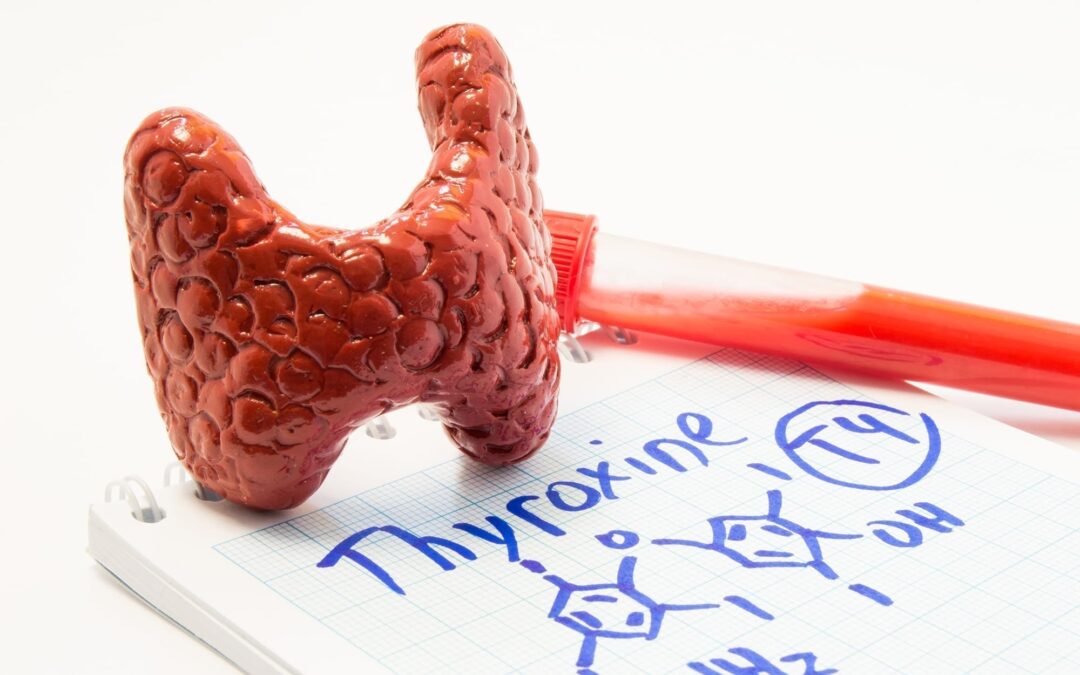By Josh Redd, MS, DABFM, DAAIM, Chiropractic Physician
Adequate thyroid function depends on more than the thyroid gland producing enough hormone. The majority of the thyroid hormone the thyroid gland produces is an inactive form, called T4. In order for the cells to be able to use it, it must first be converted to an active form called T3. Poor conversion is frequently overlooked because it does not necessarily affect TSH levels. You need to know whether your body is optimally converting T4 to T3 if you have hypothyroidism symptoms, including if you take T4 thyroid medication.
A brief overview of thyroid T4 and T3 hormones
The vast majority of the thyroid hormone your thyroid gland makes is thyroxine, or the inactive T4—about 94 percent. The thyroid gland produces a mere 6 percent of the active triiodothyronine, or T3.
After they are released from the thyroid gland, T4 and T3 travel throughout the bloodstream bound to thyroid-binding proteins. Once they arrive at their designated cellular destinations, they are freed to attach to cellular receptors.
The liver does most of the conversion of T4 to T3, but it also happens in the heart, muscle, gut, and nerves. About 20 percent of T4 can be converted to T3 by healthy gut bacteria.
Also, not all T4 converts. Only about 60 percent of T4 is converted into T3. About 20 percent becomes reverse T3 (rT3), an inactive and unusable form. It’s common to see rT3 levels elevated from major trauma, surgery, or severe acute or chronic illness. Also, in some individuals, very low-carb diets or ketogenic diets seem to produce higher levels of rT3 at the expense of active T3.
Liver and gut health are important for thyroid conversion
As the liver and gut are the primary locations for conversion of T4 to T3, it pays to make sure these systems are functioning optimally.
The liver performs important functions filtering the blood, clearing toxins, and metabolizing hormones for removal from the body. These processes create byproducts that go through the gallbladder before elimination from the body.
In a self-perpetuating vicious cycle, low thyroid function makes the liver and gallbladder sluggish and poorly functioning, which can hinder conversion of T4 to T3.
Also, a sluggish liver fails to break down hormones properly and can send them back into the bloodstream in a more toxic form and at elevated levels. This is especially true of estrogen, which impacts the conversion of T4 to T3 when it’s elevated.
High estrogen also creates too many thyroid-binding proteins so that thyroid hormones can’t free up to attach to cell receptors.
Healthy gut bacteria convert about 20 percent of T4 into T3. This is why a healthy gut microbiome is so important for thyroid health. We improve our gut bacteria by eating at least 25 grams of fiber a day and eating a wide diversity of produce that we rotate regularly.
Poor diets that are low in produce and high in sugars and processed carbohydrates can prevent sufficient conversion of T4 to T3.
Antibiotic use, which kills good bacteria, can also lower thyroid function. Avoid unnecessary antibiotic use and ask me how to restore your gut flora if you do need to take antibiotics.
Chronic stress prevents conversion of T4 to T3
Chronic stress also impacts thyroid conversion in a number of ways.
- It increases the activity of thyroid binding proteins so that T3 can’t get free in the bloodstream to attach to cell receptors.
- It promotes liver and gallbladder sluggishness, gut inflammation, and poor gut bacteria health so that conversions in these key areas are impacted.
- It also causes cell receptors to become less sensitive to T3 and raises the stress hormone cortisol, which also hinders conversion of T4 to T3.
- Inflammation is probably the most common source of chronic stress, so you must figure out where your inflammation is coming from.
- It could be leaky gut, a viral or bacterial infection, food intolerances, chemical sensitivities, or—and this is what we most commonly see in our clinic—blood sugar that is chronically too high or too low.
As you can see, there is more to thyroid activity than your TSH levels. Contact my office if you think you are not converting T4 to T3 sufficiently, or if your test results showed this, and we will help you get to the root cause of poor thyroid hormone conversion.
To learn more about Hashimoto’s and other factors that can cause hypothyroidism, read my book The Truth About Low Thyroid contact one of our wellness centers for more information.
About Dr. Redd
Josh Redd, MS, DABFM, DAAIM, is a chiropractic physician and author of the Amazon bestselling book The Truth About Low Thyroid. Dr. Redd owns seven functional medicine clinics in the western United States and sees patients from across the country and around the world who are suffering from challenging autoimmune, endocrine and neurological disorders. Dr. Redd also teaches thousands of health care practitioners about functional medicine and immunology, thyroid health, neurology, lab testing, and more.
[ARTICLES]

